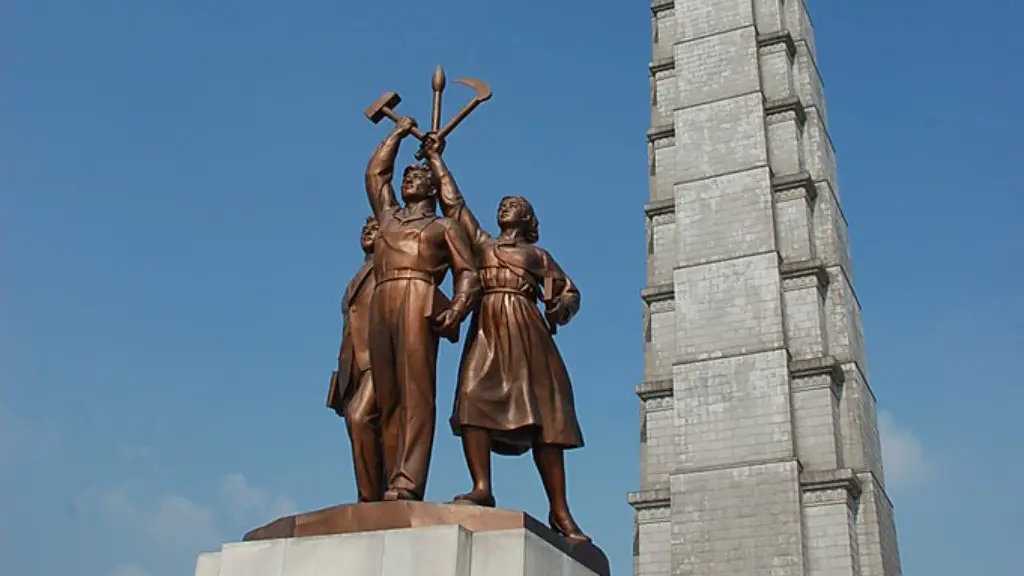Economic Impact of War
The economic impact of a potential war with North Korea would be drastic, with investments going down, trade suffering and economies destabilizing. Military conflict is always expensive and could be disastrous to global markets, affecting both the combatants and other countries. According to the Stockholm International Peace Research Institute (SIPRI), the global military expenditure in 2019 was estimated at $1822 billion – more than it had ever been since the end of the Cold War.
The impact of a war with North Korea could be even more detrimental to the global economy, particularly to the countries already struggling with poverty amid a pandemic. Additional economic strain can weaken the health of an already fragile economic system.
According to a report by the Asian Development Bank, South Korea will be the most affected, as 68.3% of the country’s economic output comes from industry and services, making the country extremely vulnerable to economic downturns. Furthermore, a spillover of the conflict could affect China, Japan and Mongolia, as they all border North Korea. The World Bank states that tariffs, restrictions, and closures of borders, which occur during periods of political unrest, have a tremendous impact on cities, as industries suffer and people lose their jobs.
The US, on the other hand, has a heavily diversified economy with a complex and interdependent network of global production and corporate structures. According to US Defense Secretary Mark Esper, any conflict with North Korea could endanger these structures, as well as undermine US security. Moreover, the US Defense Department could be forced to allocate more of their budget towards the defense of the country, compromising other areas such as health and education in the process.
Military Strength
International and regional military strength is an important factor in determining the length of any war. North Korea’s military expenditure is estimated to be around $8.49 billion and has a standing army of 1.2 million people. With such extensive resources, the country is well-equipped to wage wars and could last long if it had support from other nations.
On the other hand, the US has the most powerful military forces in the world, estimated at $732 billion in military spending and one of the largest navies and armies in the world. However, the US also has a strong commitment to global security, which could make them consider alternative solutions to a potential war.
Other countries in Asia may also play a role in the war, particularly China and Russia, who are both allies of North Korea. China has the world’s largest military and is the country with the highest defense spending, at $261.1 billion. They have a standing army of over 2.1 million people, and could intervene and extend the war if they supported North Korea.
Moreover, as a permanent member of the UN Security Council, China would have the power to influence the decision and outcome of any conflict. Russia, on the other hand, is the second largest military spender in the world, with $65.1 billion in military expenditure and 1 million people in active service.
Political Support
The support or opposition of other countries is also an essential factor in the length of a war. North Korea was once part of the Soviet Union and thus, has close political connections with Russia. Furthermore, with the dissolution of the Soviet Union in 1991, North Korea’s relationship with China only deepened. As a result, the country is likely to receive aid from both these countries in a potential war.
The US, however, has declared that it is not interested in war, and instead has a policy of diplomatic negotiations and sanctions to contain North Korea’s nuclear program. However, many countries in the region, including Japan and South Korea, have supported the US in its efforts to contain North Korea, so the US could rely on a strong international coalition in a potential conflict.
Moreover, the US could also count on the support of international organizations, such as the United Nations, who threatened to impose sanctions on North Korea in 2017. This could put international scrutiny on Pyongyang, bringing the war to a quicker end.
Population Perspective
The views of the citizens of North Korea and other countries involved in the war are important considerations as well. The North Korean population is known to have a strongly negative view of the US, as propaganda against the US has been spread for generations. This means that the North Korean people would be less likely to accept any negotiation or resolution without a fight.
Furthermore, other countries in the region, such as South Korea, Japan, China and Russia, would also be martially involved in the conflict. This means that the countries can not only be affected by war-related costs, but also they could face loss of lives, property and other casualties. This could cause public opposition to the war, which in turn could force the governments to end the conflict.
Human rights groups have also argued that the citizens of North Korea would be the most affected by the war. The regime in Pyongyang is infamous for its human rights violations, and a war could prove devastating for citizens living in North Korea, who are not used to conflict, and could further weaken their already fragile situation.
Finally, Technology
In any war, the availability of new technological advances can determine its duration. In a potential war with North Korea, both sides would use modern equipment and weaponry. North Korea has invested heavily in military and information technology, and is thought to possess numerous weapons of mass destruction. As a result, warfare could become much more intense and prolonged, as both sides work to find effective countermeasures against each other.
The US, on the other hand, has the most advanced military technologies in the world, such as stealth bombers and drones. Moreover, their weapons are thought to be more advanced and precise than North Korea’s, which could give them an advantage in a conflict. How quickly the US can deploy their weapons and tactics will also be a deciding factor in the duration of the war.
Cyberwarfare
The war with North Korea will also see an increased use of cyberwarfare. Many countries have the capability to launch cyberattacks and have used this tactic in the past, such as in the case of the US-Iranian crisis in 2019. In the future, this technology could be further advanced, making it even more difficult for countries to defend themselves against a cyberattack.
North Korea is known to possess a highly advanced cyberwarfare capability, leaving the US vulnerable to potential attacks from the country. For example, North Korea has allegedly been behind the 2014 Sony Pictures attack, as well as attempts to steal cryptocurrencies and interfere with the US presidential elections. As such, the US will have to task its military and intelligence agencies to keep up with the latest trends in cyberwarfare, or risk falling behind in the fight.
As a result, cyberwarfare will likely become an essential factor in the war. Both sides will invest in cyber infrastructure to gain an advantage over the other, while at the same time trying to protect their own systems from attack.
Economic Sanctions
In addition to technology, economic sanctions can also play a role in determining the outcome of a war. Economic sanctions are often imposed by one or more states on another state, and are meant to limit a target’s ability to conduct certain activities, such as importing goods or services. The US has already placed sanctions on North Korea, in an attempt to limit its nuclear programme. These sanctions have had a significant impact on the North Korean economy, which could further escalate hostilities between the two countries.
Moreover, other countries in the region have also imposed sanctions on North Korea, including Japan, South Korea and China. These sanctions have had drastic consequences, causing shortages of basic goods, such as food and medicines, and have even led to famine and starvation in some parts of the country. Furthermore, these sanctions have hampered North Korea’s ability to engage in global trade, and could be used to further limit the country’s resources if the war escalates.
The economic impact of such sanctions can be significant, as countries and businesses could suffer losses due to disrupted trade. This could force all involved parties to reach a peace agreement, as opposed to slogging through a prolonged war.
Regional Allies
The allies of countries involved in the conflict can also affect the duration of the war. North Korea has close diplomatic ties with both China and Russia, and could receive aid from these countries during a potential war. China is North Korea’s largest trading partner, and could provide vital resources to the country during times of conflict. Moreover, Russia is North Korea’s closest ally, and could provide political, economic and military support if the war escalates.
The US, on the other hand, has closer ties with its allies in the region such as Japan and South Korea, who could join the fight if it were in their strategic interests. The US also has an ally in the United Nations, which could mediate the conflict and force both sides to reach a peaceful resolution. However, all these depend on the stance of the governments involved in the conflict.
Furthermore, the geopolitical landscape of Asia is constantly changing and tensions between countries often shift due to domestic and international factors. This means that alliances can change rapidly and unpredictably, which could affect the duration of a potential war with North Korea.
Final Thoughts
It is difficult to predict the length of warfare, but many factors can have an impact on its duration. These include economic and military strength, as well as the support and opposition of other countries and international organizations. Additionally, public and population views, technological advancements and economic sanctions could all play a role in determining how long a war between North Korea and the US could last.





